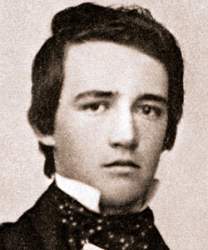Record Data
Source citation
"The Mask Removed," Chicago Tribune, February 21, 1866, p. 2.
Type
Newspaper
Date Certainty
Exact
Transcriber
John Osborne, Dickinson College
Transcription date
Transcription
The following text is presented here in complete form, as it originally appeared in print. Spelling and typographical errors have been preserved as in the original.
THE MASK REMOVED
The President's veto of the Freedmen's Bureau Bill, will at least have one good effect, namely: in affording a conclusive proof to doubting souls of Mr. Johnson's recreancy to the great cause for which our people laid down their lives and their property, and convincing our citizens, by the logic of a most ugly fact, of the backsliding of their Chief Magistrate, which, not withstanding the most ominous indications, they have been, so far, loth to believe.
For many months we have been urging our people to arouse from their apathy, and while certain pusillanimous organs of the press East and West, could only be brought to say anything in opposition to the President and his tool, Raymond, of the New York Times, by the fear of losing their subscribers, and even now, dare only to speak of these bad men with a censure tempered by affection, the Chicago TRIBUNE dared to proclaim to the American people the sad tidings of the defection of Mr. Lincoln's successor, and summoned them week after week, and day after day, to come to the rescue and prevent the achievements of the battle-field from being blasted and nullified by the perverseness of the Executive.
The oration extended to Mr. Johnson immediately after the proclamation of his veto by the Washington sympathizers with the late rebellion, and the exulting shoults of triumph raised by the Chicago Times and the minions of the South all over the land, cannot but remind the country of the ominous salutes and serenades which greeted Pierce on the repeal of the Missouri Compromise. All that is required now by the President to give the death-blow to liberty is to muzzle the press opposed to him as efficiently in this country as it has been crushed by Napoleon in France, and while the rebel sheet in Richmond has been allowed by the President to resume its onslaught upon the Union, it would be a move in the right direction to have the leading organs of the "extremist" in the North "got out of the way," according to the programme announced by the President in his recent conversation with the Virginians.
Those editorial mediocrities who, fresh from the ranks of the Democracy, preach on Republicanism with about the same enthusiasm as a Pagan, constrained by expediency to embrace Christianity, praises the Sermon on the Mount, or hide-bound Papists descant on the blessed dispensation of liberty of the Pilgrim Fathers, will again exhaust all the weak resources of their special pleading and hair-splitting casuistry to eliminate from the President's long-winded missage some phrase or another to atone to some extent for his delinquency, so that they may seem to court the applause of the people, as Republican organs, and at the same time retain the good will and the favor of the "powers that be."
The people of Illinois will hardly be satisfied with such a tortuous course. The President's arguments are not at all to the purpose. It is his Sourthern anumus that vitiates the entire document. It is the fact that he has arrayed himself in hostility against a loyal Congress, representing a loyal people who saved the country, and thrown himself into the arms of his and their deadly enemies that impeaches the President's position and discloses his motives. He denies the protection againast the late rebel slaveholders which the vetoed bill proposes to afford to the freedmen of the South upon the grounds (among other reasons) that the "safeguards which the wisdom and experience of ages taught our fathers to establish as securities for the protection of the innocent, the punishment of the guilty, and the equal administration of justice," are to be set aside by the proposed bill, and "for the sake of a more vigorous interposition in behalf of justice we are to take the risk of many acts of injustice that would of necessity follow from an almost countless number of agents established in every parish or county in nearly a third of the States of the Union." etc. Like Tyler, Pierce and Buchanan, Mr. Johnson is full of reverence for the Constitution, and goes off in true Southern style about the wisdom of our fathers and the experience of ages. Let us tell Mr. Johnson that our fathers never anticipated that "nearly a third of the States of the Union" would rise in rebellion "against the safeguards which the wisdom and experience of ages" taught them to establish, and that, so far as they did anticipate it, they set upon treason the penalty of death as security for the protection of the innocent and the punishment of the guilty.







